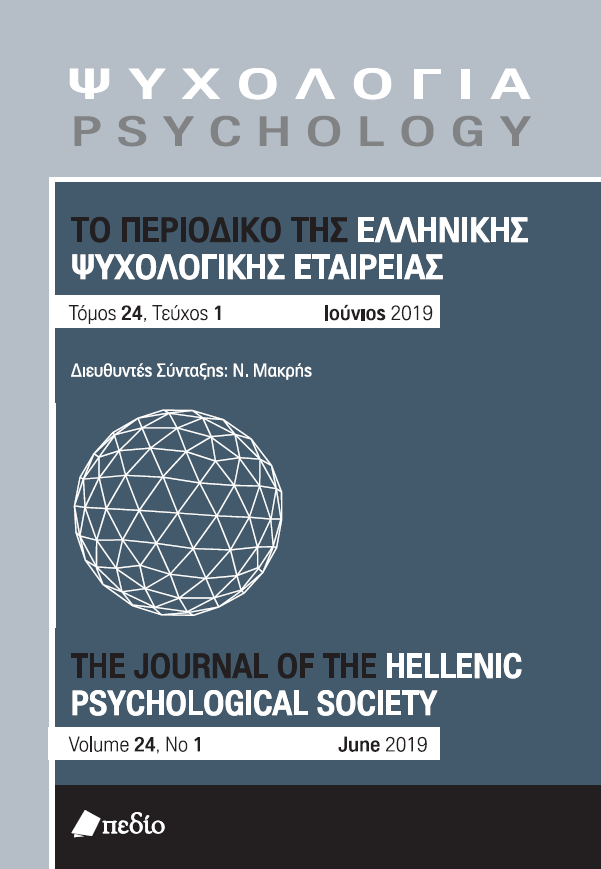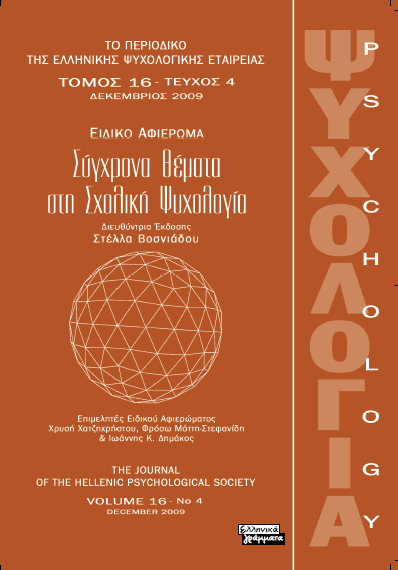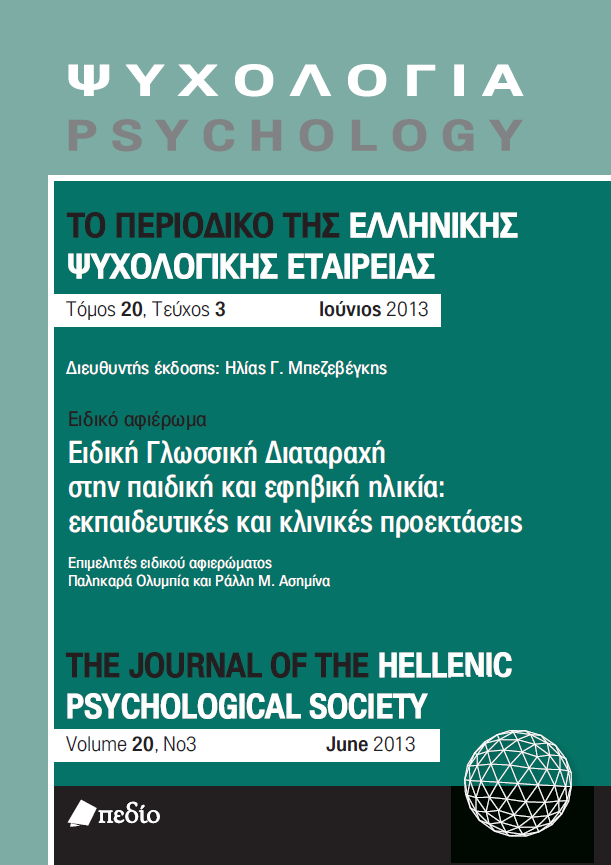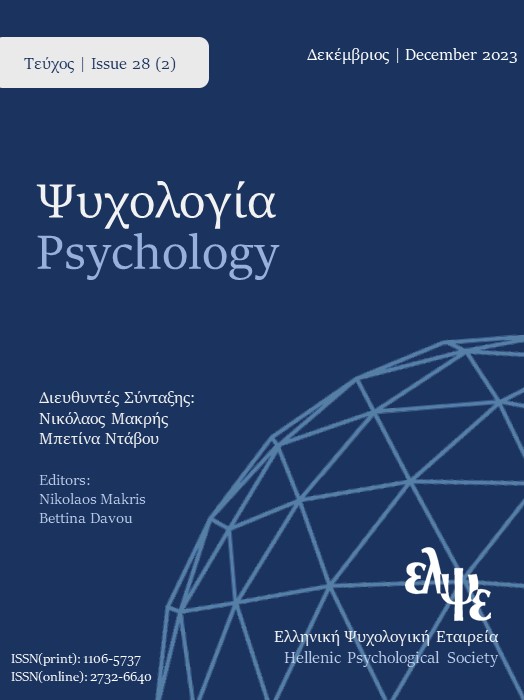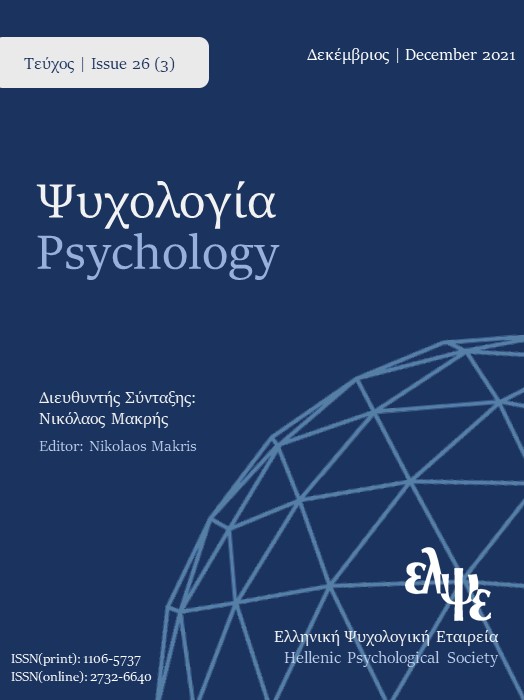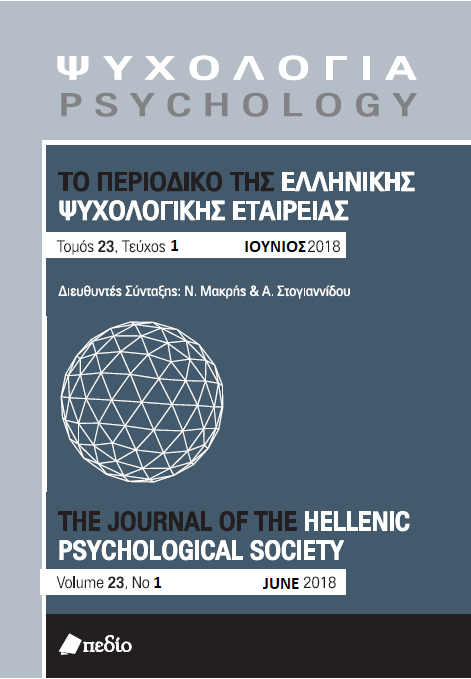Ακαδημαϊκά συναισθήματα και κίνητρα για την ανάγνωση: προκαταρκτικά ευρήματα για την ανάπτυξη και τις μεταξύ τους σχέσεις στην παιδική ηλικία και την προεφηβεία
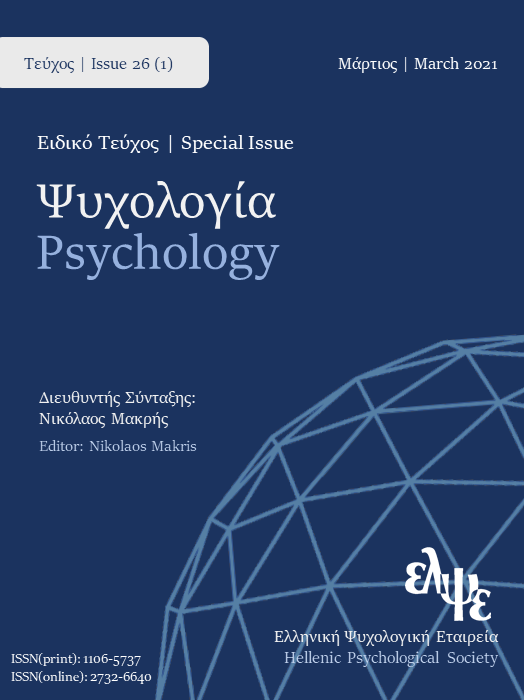
Περίληψη
Σύμφωνα με πρόσφατες έρευνες, ποικίλοι παράγοντες που συνδέονται τόσο με τη γνωστική όσο και με την ψυχοσυναισθηματική ανάπτυξη των μαθητών φαίνεται να επιδρούν στην επίδοσή τους σε διάφορες διαστάσεις της μάθησης. Ειδικότερα, οι έρευνες έχουν στραφεί στη μελέτη παραγόντων όπως είναι τα ακαδημαϊκά συναισθήματα και το πώς αυτά επηρεάζουν τη στάση των μαθητών και τα κίνητρά τους για μάθηση γενικότερα. Η παρούσα μελέτη επιχειρεί μια προκαταρκτική διερεύνηση των αναπτυξιακών διαφορών σε ψυχοσυναισθηματικές μεταβλητές της μάθησης και ειδικότερα των ακαδημαϊκών συναισθημάτων και των κινήτρων για την ανάγνωση κατά τη σχολική ηλικία. Στην έρευνα συμμετείχαν μαθητές της Γ΄ (Ν = 85) και της Ε΄ δημοτικού (Ν = 76). Για τη συλλογή των δεδομένων της έρευνας χρησιμοποιήθηκαν τα ακόλουθα εργαλεία: (α) Ερωτηματολόγιο Ακαδημαϊκών Συναισθημάτων – Δημοτικό Σχολείο, (β) Ερωτηματολόγιο Ακαδημαϊκών Συναισθημάτων για Προεφήβους, (γ) Κίνητρα για την Ανάγνωση όπως και (δ) Ερωτηματολόγιο Αυτορρύθμισης και Κινήτρων Ανάγνωσης. Τα μεγαλύτερα παιδιά ανέφεραν χαμηλότερα επίπεδα κινήτρων στην ενασχόλησή τους με την ανάγνωση τόσο στη σχολική τάξη όσο και στον ελεύθερο χρόνο τους. Ως προς τα ακαδημαϊκά συναισθήματα, παρατηρήθηκε ότι όσο αυξάνεται η ηλικία μειώνεται η ευχαρίστηση για την ανάγνωση. Επίσης, τα θετικά συναισθήματα συσχετίστηκαν θετικά με τα εσωτερικά κίνητρα σε αντίθεση με τα αρνητικά, τα οποία παρουσίασαν θετική συσχέτιση με τα εξωτερικά κυρίως κίνητρα. Τα ευρήματα συζητούνται σε σχέση με τα περιορισμένα – ιδιαίτερα στον ελλαδικό χώρο – σχετικά δεδομένα. Η περαιτέρω διερεύνηση των σχέσεων των παραπάνω μεταβλητών με την ανάγνωση αναμένεται να συμβάλει στην πληροφόρηση όσων εμπλέκονται στον σχεδιασμό εκπαιδευτικών παρεμβάσεων οι οποίες αποσκοπούν στην ενίσχυση των κινήτρων των μαθητών και στην ανάπτυξη θετικών συναισθημάτων κατά τη μαθησιακή διαδικασία.
Λεπτομέρειες άρθρου
- Πώς να δημιουργήσετε Αναφορές
-
Δημητροπούλου Π., Φιλιππάτου Δ., Χρυσοχόου Ε., Ρούσσος Π., Ράλλη Α. Μ., Διακογιώργη Κ., Οικονόμου Α., & Γρίβα Α. (2021). Ακαδημαϊκά συναισθήματα και κίνητρα για την ανάγνωση: προκαταρκτικά ευρήματα για την ανάπτυξη και τις μεταξύ τους σχέσεις στην παιδική ηλικία και την προεφηβεία. Ψυχολογία: το περιοδικό της Ελληνικής Ψυχολογικής Εταιρείας, 26(1), 73–87. https://doi.org/10.12681/psy_hps.26227
- Ενότητα
- ΕΙΔΙΚΟ ΑΦΙΕΡΩΜΑ

Αυτή η εργασία είναι αδειοδοτημένη υπό το Creative Commons Attribution-ShareAlike 4.0 International License.
Το περιοδικό ΨΥΧΟΛΟΓΙΑ έχει υιοθετήσει μία πολιτική Platinum open-access. Τα έξοδα υποβολής, επεξεργασίας ή δημοσίευσης των εργασιών καλύπτονται από την Ελληνική Ψυχολογική Εταιρεία. Τα πνευματικά δικαιώματα των δημοσιευμένων εργασιών προστατεύονται από την άδεια 'Creative Commons Attribution-ShareAlike 4.0 International'. Οι Συγγραφείς διατηρούν τα Πνευματικά Δικαιώματα και χορηγούν στο περιοδικό το δικαίωμα της πρώτης δημοσίευσης. Η άδεια αυτή επιτρέπει σε τρίτους, να χρησιμοποιούν την εργασία σε οποιαδήποτε μορφή, με την προϋπόθεση της διατήρησης των διατυπώσεων που προβλέπονται στην άδεια σχετικά με την αναφορά στον αρχικό δημιουργό και την αρχική δημοσίευση στο περιοδικό ΨΥΧΟΛΟΓΙΑ. Επιπλέον, κάθε διανομή της εργασίας οφείλει να γίνεται με τους ίδιους όρους διανομής, δηλαδή με την ίδια άδεια Creative Commons.



